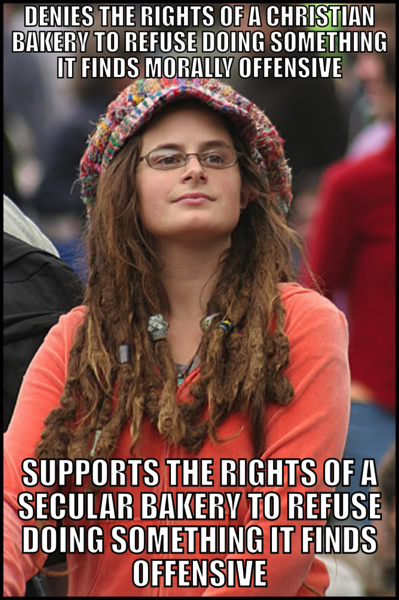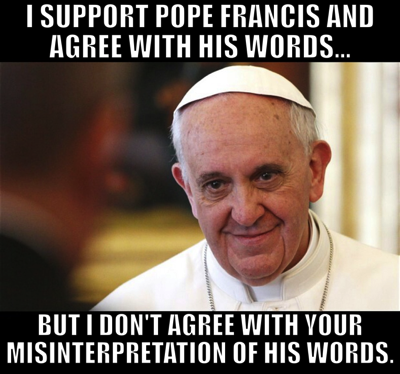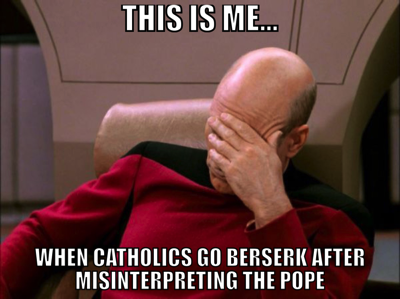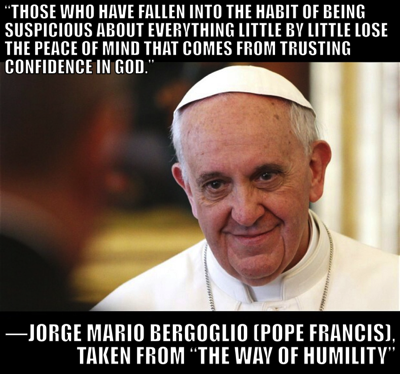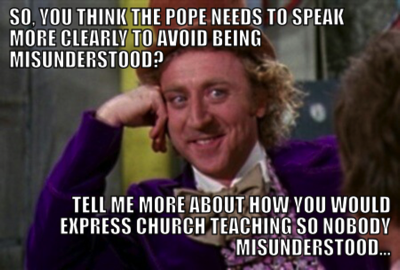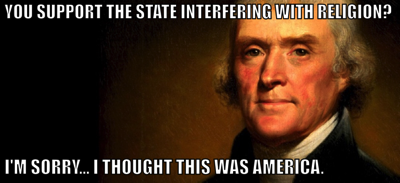I can understand the reactions of the current rebellion in the Church—I don’t condone it, but I understand it. There is a dual reaction to anything that sounds funny. There is fear that those who are dissenters against Church teaching will get their way and change the teaching of the Church. There is also anger over the apparent inactivity of those responsible for leading the Church when it comes to these dissenters. When you think of it this way, it’s easy to start thinking of the Church in terms of “good guys” and “bad guys.” This is entirely natural.
However, even though it is natural, it is not what we are called to be as members of the Catholic Church. We’re called to take part in the Great Commission (Matthew 28:18-19):
18 Then Jesus approached and said to them, “All power in heaven and on earth has been given to me. 19 Go, therefore, and make disciples of all nations, baptizing them in the name of the Father, and of the Son, and of the holy Spirit, 20 teaching them to observe all that I have commanded you.* And behold, I am with you always, until the end of the age.”
God does not rejoice in the death of the sinner (See Ezekiel 18:31-32 and Ezekiel 33:11), and wants their salvation. He also sends His Church to reach them. In different ages, the Church can use different means to reach them. While individually we may have a preference for a specific method, we need to recognize that ultimately the teaching authority of the Church sets the tone, and we need to avoid undermining their work.
What we always need to keep in mind is that our task is not to take part in the condemning of sinners to damnation, but to reach out to them in love, telling them of the need for salvation, but letting them know that they are loved. At times, we need to admonish and warn the sinner. But if we don’t show our love for the sinner, instead giving them a sense of “you sinners disgust me,” then we will not be effective in our ministry.
Pope Francis gets a lot of flack here. Some Catholics accuse him of being too soft, too lenient when it comes to dealing with the sinners. But I am reminded of a similar story about another man named Francis—St. Francis de Sales. Consider this from an 1887 book on saints speaking about St. Francis de Sales and his approach as bishop of Geneva.
At times the exceeding gentleness with which he received heretics and sinners almost scandalized his friends, and one of them said to him, “Francis of Sales will go to Paradise, of course; but I am not so sure of the Bishop of Geneva: I am almost afraid his gentleness will play him a shrewd turn.” “Ah,” said the saint, “I would rather account to God for too great gentleness than for too great severity. Is not God all love? God the Father is the Father of mercy; God the Son is a Lamb; God the Holy Ghost is a Dove, that is, gentleness itself. And are you wiser than God?”
[From: John Gilmary Shea, Pictorial Lives of the Saints (New York; Cincinnati; Chicago: Benziger Brothers, 1887), 67–68.]
The concern for showing love for the sinner was not an example of “modernism,” or other errors.
Unfortunately, some people fall into the other error. They believe that if we are called to love, we cannot say that what they do is wrong. That’s never been taught by the Church at all, and those who accuse (or praise) the Pope of saying so have missed the point. Our Lord Himself has spoken about the dangers of hell and the need to repent. In Matthew 7, (the chapter where He warns about judging—so often taken out of context), He warned:
13 “Enter through the narrow gate; for the gate is wide and the road broad that leads to destruction, and those who enter through it are many. 14 How narrow the gate and constricted the road that leads to life. And those who find it are few.
and:
21 “Not everyone who says to me, ‘Lord, Lord,’ will enter the kingdom of heaven, but only the one who does the will of my Father in heaven. 22 Many will say to me on that day, ‘Lord, Lord, did we not prophesy in your name? Did we not drive out demons in your name? Did we not do mighty deeds in your name?’ 23 Then I will declare to them solemnly, ‘I never knew you.* Depart from me, you evildoers.’
But Jesus, even when warning of the reality of hell, never stopped loving the sinners. He loved the tax collector. He also loved the Pharisee.
So, this makes me think about how we are acting in the blogosphere and in the comboxes. What kind of witness are we leaving? Do we show that we love, and desire the salvation of, Obama or Pelosi? Or the person struggling with same sex attraction? Or the atheist? Or how about Fr. Hans Küng? Cardinal Kasper? Fr. Richard McBrien (who died recently) How that bishop or pastor you can’t stand? Do we pray for them? And by pray, I don’t mean “Oh Lord, please make Bishop So-and-so not be an idiot!” Do we show our love for these people in our prayers?
I don’t say this judgmentally. Lord knows I have been rude and sarcastic. I get pissed off with the Super Catholic who thinks they cannot err while the Pope can. So I certainly need to learn to practice what I am preaching here. Indeed, next week I might be back to being sarcastic and mocking of those I disagree with, and I certainly need your prayers.
I just ask that all of us who witness the Catholic faith, whether face to face, by blog, by Facebook or Twitter (or whatever else is popular out there)—let’s remember that how we act is a part of our witness as part of the Great Commission. And let’s pray for each other as well.


